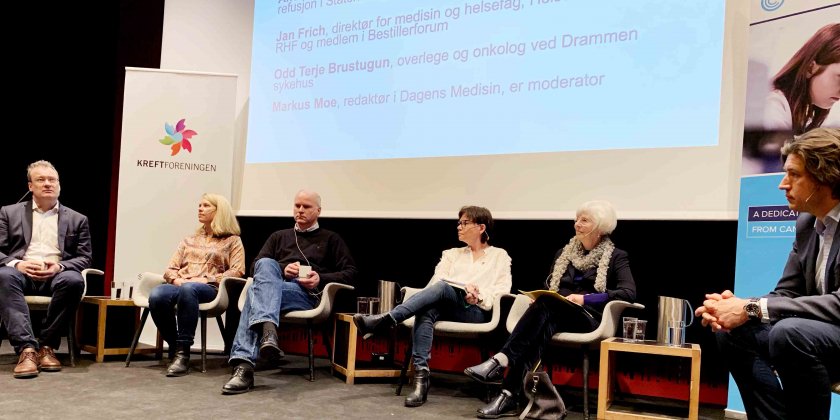Giving patients a stronger voice
How can the voices of cancer patients be heard when evaluating new methods of treatment?
A breakfast seminar was held yesterday in the series called The Cancer Treatments of the Future. Over 150 people attended at Litteraturhuset in Oslo, among them were relevant key players from the healthcare sector, governmental agencies, patient organisations and the public. The aim was to identify new opportunities to improve patient involvement when evaluating new methods of treatment.
The seminar was jointly arranged by Oslo Cancer Cluster, Legemiddelindustrin (LMI) and The Norwegian Cancer Society. The sponsors of the event were Astra Zeneca, Janssen and MSD.
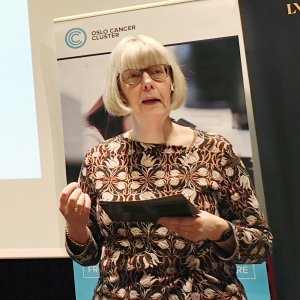
Anne Grethe Erlandsen, the State Secretary of the Norwegian Ministry of Health and Care Services.
Anne Grethe Erlandsen, the State Secretary of the Norwegian Ministry of Health and Care Services, first talked about creating a healthcare service with the patient as the starting point. She said that it is important to involve the patient in the decision-making processes to bring in new perspectives, ask questions and challenge the healthcare service.
“The patient is the most radical agent of change in the healthcare sector.”
Anne Grethe Erlandsen
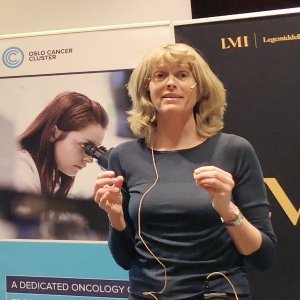
Ellen Nilsen, Special Adviser at Nye Metoder.
Next, Ellen Nilsen, Special Adviser at Nye Metoder, which is the national system for managed introduction of new health technologies within the specialist health service in Norway. Nilsen gave a presentation of Nye Metoder and its processes.
“Anyone, including patients, their relatives or patient organisations, can submit a proposal for a new method of treatment.” Ellen Nilsen
The proposal is then managed by the regional health authorities in The Commissioning Forum, which commissions a full Health Technology Assessment (HTA) from The Norwegian Medicines Agency. Anyone can submit input to The Commissioning Forum by e-mail or in a form on the website.
Decisions are then made by the regional health authorities in The Decision Forum, based upon the HTA. Patient organisations are also represented in a reference group that meets every six months. The patient representatives are only observers, but have the right to make verbal contributions.
- Learn more about Nye Metoder by reading this presentation in English from their official website.
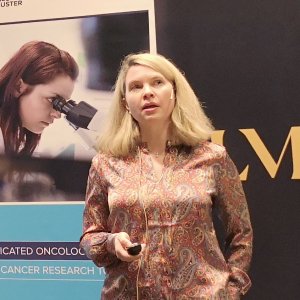
Anette Grøvan, Senior Adviser at The Norwegian Medicines Agency.
Then, Anette Grøvan, Senior Adviser at The Norwegian Medicines Agency, presented how they are developing a pilot project to involve patients in their HTAs. They have sporadically received input from patients and patient organisations in the past, but they wish to implement a better system for it now.
“Satisfied patients are important to us. Everyone should have a voice, regardless of their diagnosis or disease.” Anette Grøvan
They believe the patients can contribute with their experiences of living with the disease, the quality of existing treatments and their expectations on new treatments.
A panel discussion, moderated by Markus Moe, the Editor-in-Chief of Dagens Medisin, was then held with the following participants:
- Tove Nakken, Head of brukerutvalget* at Oslo University Hospital and Deputy Head in Lymfekreftforeningen (The Norwegian Lymphoma Society)
- Heidi Brorson, member of brukerutvalget* at the South-Eastern Norway Regional Health Authority and Special Adviser in the Norwegian Cancer Society
- Anette Grøvan, Senior Adviser at The Norwegian Medicines Agency
- Jan Frich, Chief Medical Officer at the South-Eastern Norway Regional Health Authority and Senior Adviser in the Commissioning Forum
- Odd Terje Brustugun, oncologist at Drammen Hospital
*”brukerutvalget” is a selected group of patient representatives that exists in each regional health authority

The topic of the panel discussion was how to improve patient involvement when evaluating and approving new methods of treatment.
Nakken first highlighted the lengthy processes in Norway: “Patients want to take part of the treatments that have been approved in our neighbouring countries. But the bureaucracy in Norway takes too long.”
Brustugun agreed that there is a gap between the treatments available in Norway and abroad, and that this is affecting an ever-growing patient population: “The patient’s perspective is important, because there is a large group of patients that can potentially become long-term survivors if given the new treatments.”
Frich said the overall cost of pharmaceuticals in Norway has actually increased over the years, mostly due to new and expensive cancer therapies. He explained they are legally obliged by Stortinget to evaluate new methods according to a specific set of criteria. The reason that a treatment isn’t approved may be that the effect of it has not been documented well enough.
Brorson called for greater transparency in the decision-making processes: “If there was more openness about the decision-making, the patients would have a greater understanding for it and become better informed.”
Grøvan added: “We are not finished developing the system for patient involvement and there are a lot of considerations to make sure that it becomes structured and fair.”
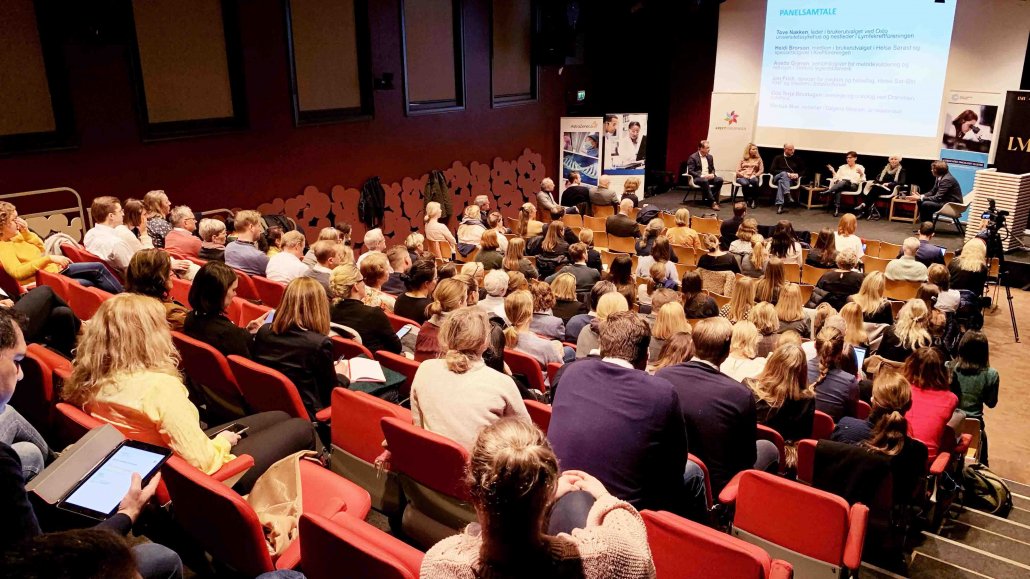
The engaging panel discussion inspired the audience to make their own comments and reflections.
The fruitful discussion led to many constructive ideas on how to improve patient involvement. Hopefully, these kinds of collaborative discussions can inform politicians to take the necessary steps forward to improve cancer patients’ lives.
Oslo Cancer Cluster wants to thank the speakers, the sponsors, the organisers and everyone who attended! This discussion will continue at Arendalsuken 2019, at our event August 15. We hope to see you there!
- Here is a summary of the event, written in Norwegian, from LMI’s official website.

